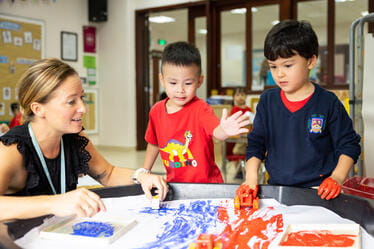Primary STEAM and the MIT Challenge This term, Year 6 have been working on completing their entries for the first of this year’s MIT Challenges. The challenge requires students to design something to help astronauts eat, play sport, or do exercise more easily when they are in space. The lack of gravity in space means that eating a bowl of noodles is almost impossible, the soup and the noodles would be floating all over the space craft.
This term, Year 6 have been working on completing their entries for the first of this year’s MIT Challenges. The challenge requires students to design something to help astronauts eat, play sport, or do exercise more easily when they are in space. The lack of gravity in space means that eating a bowl of noodles is almost impossible, the soup and the noodles would be floating all over the space craft.
The students started by imagining what it is like to experience zero gravity, they then made a short film of them pretending to be in space and trying to eat or do exercise. They used some slow-motion filming, and then some film editing to create their films. They then moved on to ideating (coming up with ideas) in teams to think of problems and solutions, this led them to designing an invention to help the astronauts.
Currently the students are finishing their designs, some teams are making a physical model of their inventions, other teams are using Computer Aided Design (CAD) to create their models. Soon each team will create a video presentation of their work, this video will then be sent to MIT in November. Hopefully the judges at MIT will like our students work. In December we will showcase the students’ work at school, we will let you know the details nearer the time.
The STEAM philosophy of Nord Anglia and of MIT encourages students to develop their problem-solving skills through being collaborative and creative. This philosophy is embedded in the Primary students’ Computing and STEAM lessons. For example, Year 5 students are currently designing a waterproof container to house a micro:bit that will collect temperature data. The problem identified by the students is that the temperature inside the container will be higher than the atmospheric temperature that we want to collect. The students are now solving that problem.
Other examples currently happening in Primary Computing and STEAM are: Year 4 students using robots to complete challenges, the coding skills needed for this are the same as the coding skills already learned, however in ‘the real world’ external factors might alter the path of the robot (i.e. wind). The Year 4 students are working on how to overcome these challenges.
Year 3 students are looking at game design and designing their own games. Year 2 students are continuing to become familiar with computers and they too are designing a game. Year 1 students are using iPads to create animated stories.
Next term, and the term after that, all Primary students will be working on new MIT Challenges. There will be more collaboration, creativity, and problem-solving.
If you ever have any questions about STEAM, Computing, or the MIT Challenges please email me, I am always happy to help parents understand my subject more.
Peter Allison
Primary Computing & STEAM Teacher






